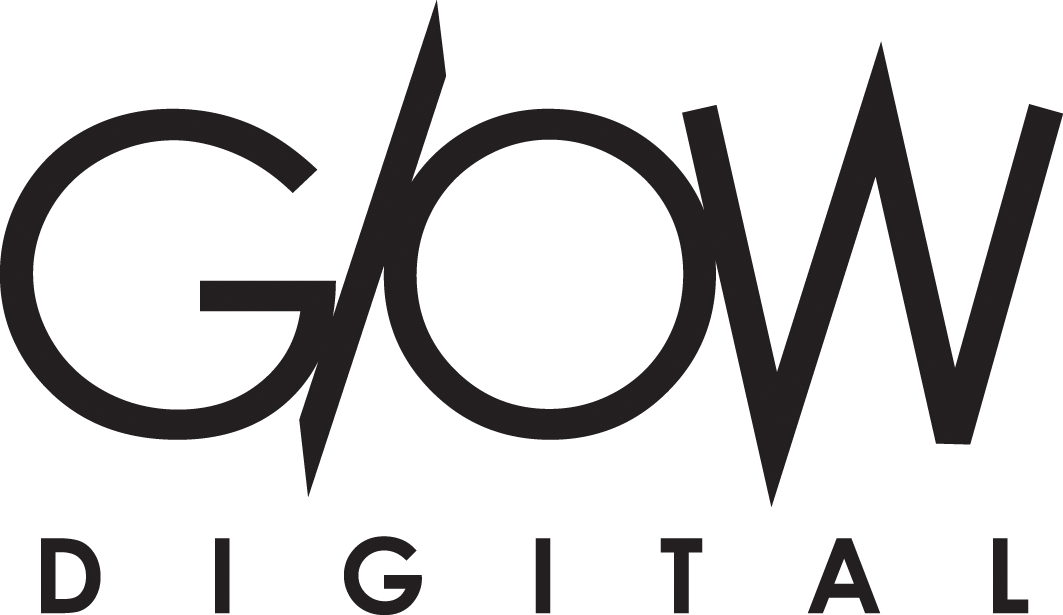Guest Posting for Backlinks. Does It Still Work?
Guest posting has long been a popular SEO tactic for gaining backlinks from other websites. At the same time, Google is increasingly cracking down on low quality content and manipulative schemes on the web, which begs the question, is guest posting still a relevant link building strategy in 2024?
Table of Contents
The March 2024 Core Update wreaked a lot of havoc by targeting low quality (often AI generated) content. With the latest (September 2024) updates to Google’s spam policy, there is further scrutiny on guest posts created primarily for backlinking purposes.
Google’s updated policy clearly states that not only buying and selling links, but in fact any content created to manipulate search results, is considered spam, and that repeated use of such tactics can get you removed from search listings.


The Evolution of Backlinks
Backlinks have always been a significant ranking factor in Google’s ranking algorithms. In the early days, the algorithm was more concerned with the quantity of links rather than the quality. This led SEOs to pursue aggressive link building tactics to get as many backlinks as possible, with little regard for relevance or authenticity.
Popular tactics would include:
Link farms:
Article spinning and submission:
Comment spam:
Over-optimizing anchor text:
Bespoke Guest Post Backlinks
As Google refined its algorithms, SEOs had to start paying more attention to the quality of the backlink. Links now had to be contextually relevant rather than placed on random content across the web. This shift required a more selective, personalised approach to outreach. Pitching strategically targeted sites emerged as a tactic, replacing bulk emails and bots.
Bespoke guest posting involves creating custom content written with a specific publication in mind. Pitches need to showcase how your unique perspective and expertise can add value for their audience.
The ideal process would look something like this:
- Thoroughly researching potential partners
- Tailored outreach conveying why you are a strong match
- Pitching thoughtfully created concepts
- Providing excellent content written by a human
Done right, bespoke guest posts published on reputable, topically relevant sites could earn high-quality backlinks.
Yet, doing this takes significant time and effort. The temptation remains to pursue shortcut tactics and “easy” links.
Enter The Link Spammer
As guest posting has grown into a major industry, it’s quite clear that quality has suffered in favour of maximising profits. Over the past decade, we’ve observed the rapid rise of link networks, along with various publisher sites accepting low-quality guest posts in exchange for payment.
At the same time, the link building space has become overrun by questionable “SEO experts” aggressively promoting link schemes without regard for authenticity or relevance. This is evident in mass-outreach email spam promising links from sites with “high Domain Authority”, a metric mostly aimed at misleading uninformed customers.
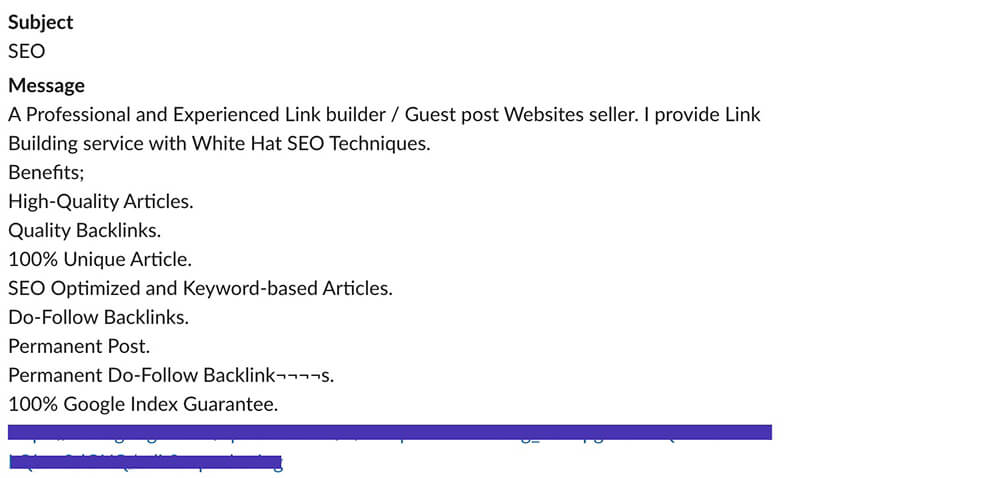
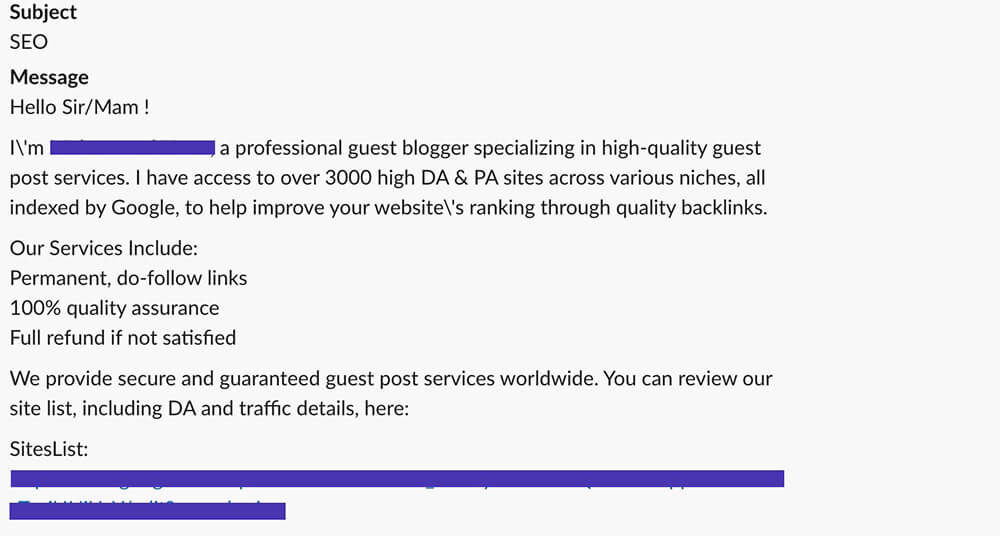

The reality is that any site being actively circulated on these link seller lists is likely to be a low-quality prospect. Domain Authority has become a nearly meaningless metric, although it is still a widely used tactic as it sounds impressive to those unfamiliar with nuances of link building.
In the last couple of years, Google has ramped up its efforts to combat this rise in link spam networks. Recent algorithm updates have seen harsh penalties for sites that sell guest post backlinks. The December 2022 link spam update was a notable one, and there have been further updates since.
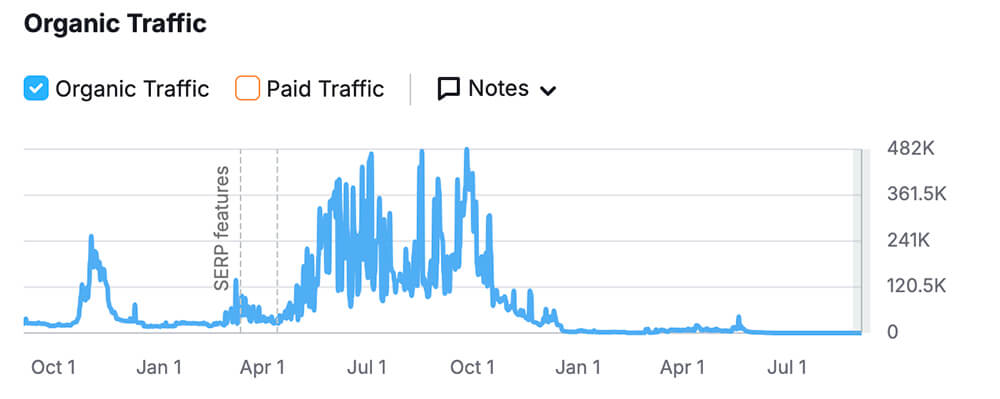
Organic traffic trend – The publisher is a regional news website whose monetization strategy for a long time involved paid guest posts, often generated with AI and focusing on questionable topics like casino/gambling and CBD. As a result, the site was heavily impacted by Google’s October 2023 core update. It seems to have faced an additional manual penalty in July 2024.
Yet the tidal wave of guest post spam continues largely unabated. The core problem with the industry is that financial incentives have long outweighed providing value. As long as backlinks are viewed as easy revenue, quality will suffer. Despite Google’s algorithms getting considerably better at identifying and de-ranking sites engaged in manipulative SEO tactics, the guest posting landscape remains plagued by questionable practices.
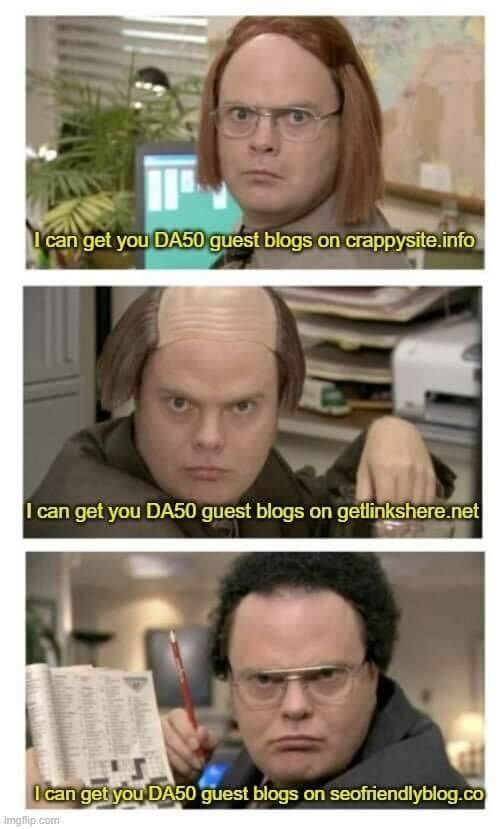
Can I Still Use Guest Posting for Link Building?
The answer is yes, guest posting can still work, but only if done correctly with the right motivations. Simply churning out and publishing AI written content will likely do more harm than good under current algorithms.
The key principle is that any content purely designed to manipulate search rankings is considered link spam. However, if you create value-driven posts that genuinely add value to a publication and its audience, high-quality links can still occur organically. The focus should be on establishing expertise and providing unique insights.
For instance, if you are a medical professional commenting on a trending health-related topic to educate readers, this offers real value.
In summary, guest posting purely for backlinks is likely to be considered link spam under current algorithms. Yet strategically placed, value-driven guest posts which organically earn links can still benefit SEO if done for the right reasons. The focus must be on the audience, not search engines.
Redefining Link Building With Digital PR
As Google continues cracking down on artificial link building tactics, smart SEOs are shifting to more sustainable strategies like digital PR. By creating newsworthy, linkable assets, and actively promoting them to the media, brands can earn high-quality backlinks naturally.
The goal should be on creating assets with inherent value that get discovered and shared rather than links begged or bought.
Promotional efforts can include personalised pitches to journalists/editors, influencer marketing to get shares and early links that spur further coverage, and outreach to relevant blogs/sites. But the linchpin is linkable assets – case studies, tools, data – that captivate target audiences and attract natural links.
This approach to link building tends to yield higher-quality backlinks from reputable sites with strict editorial controls in place. It’s time-consuming, yet effective, and sustainable.
As Google gets better at identifying and de-ranking manipulative linking tactics, brands must get creative at earning links legitimately. A refined digital PR strategy centred around compelling assets, and strategic promotion can build links sustainably.
If you are looking forward to learning how to build backlinks with digital PR, feel free to get in touch with Glow Digital today.

Author
Sari Honkala
Originally from Finland, Sari honed her marketing chops in England before finally settling in Bangkok.
She’s passionate about creating high quality content for clients, quantitative performance metrics and leveraging data for actionable insights.


